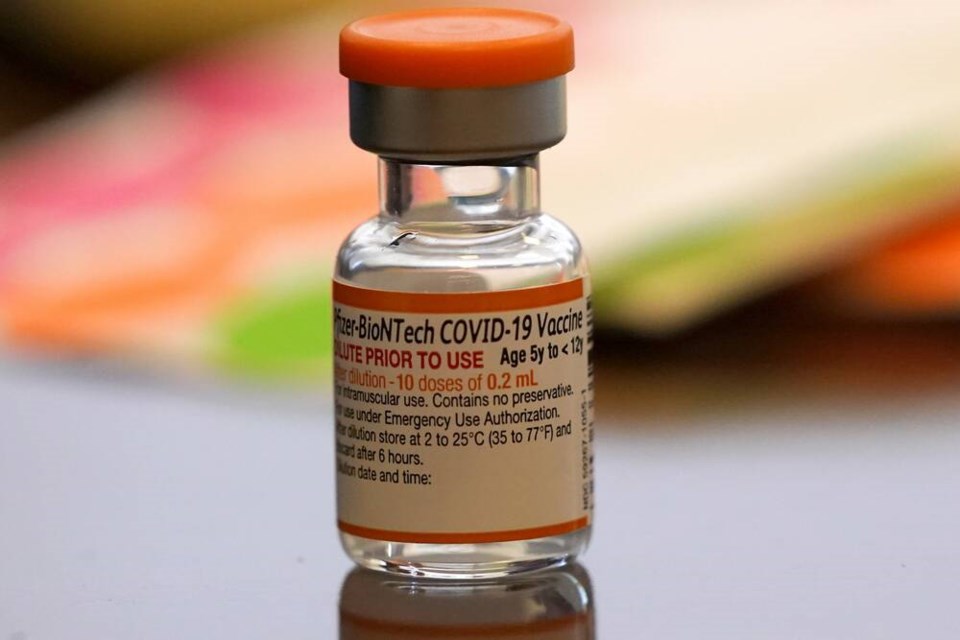B.C. children age five to 11 will be able to get their COVID-19 shots alongside or immediately before or after a flu shot or school-based vaccine when pediatric COVID-19 immunizations roll out on Monday.
The National Advisory Committee on Immunizations has advised not giving the COVID-19 shot within two weeks of other vaccines, so the cause of any side-effects can be clearly identified.
Public health officials in B.C., however, say they’re confident they can distinguish between side effects from the various vaccines and don’t want to miss an opportunity for children to be caught up on vaccines.
“From a practical point of view, we don’t want to make children wait to receive this vaccine, given the rates of transmission we’re seeing, and we don’t want children not to be protected for some of the other vaccine-preventable illness, particularly influenza,” provincial health officer Dr. Bonnie Henry said Tuesday.
Dr. Penny Ballem, who is leading B.C.’s COVID-19 immunization campaign, said appointments for the two-dose pediatric Pfizer-BioNTech vaccine, approved by Health Canada last week, will be given in the order people registered.
Invitations will go out Monday morning and same-day appointments will be booked. The province says appointments are necessary, but it wouldn’t likely turn a child away.
(Register online at getvaccinated.gov.bc.ca.)
Just over a quarter of the 350,000 children in B.C. age five to 11 have already been registered online or by phone for the shot.
The pediatric vaccines will be distributed mainly through community clinics, though some schools will be used and some clinics will be dedicated to young children.
Families can bring all their eligible children to the clinic at the same time, provided each child is booked at the same clinic on the same day, Ballem said.
The pediatric vaccines will also be offered on evenings and weekends to accommodate working parents. Children age five to 11 will not be receiving vaccines at pharmacies, though youth age 12 to 17 can.
In rural and remote areas, there will be community-wide clinics for the pediatric vaccine, which will be more open to drop-ins. In remote First Nations communities, the First Nations Health Authority and the local health authority will likely offer the pediatric COVID-19 vaccine alongside booster shots for adults age 18 and older who received their second dose at least four months ago. First and second doses of COVID-19 vaccine will also be offered for anyone age 12 and older.
Verbal consent will be required from parents at the time of vaccination, or written consent for kids accompanied by others.
Children must be age five at the time of vaccination, according to public health officials, rather than turning five this year, as has been the rule for other age-based rollouts.
B.C. is recommending eight weeks between doses of the pediatric vaccine to build stronger immunity, though the manufacturer has said three weeks is safe.
Children under age 12 account for about 20 per cent of new COVID cases in B.C., but health officials say vaccines have blunted a dramatic increase in new infections in September in the 12-to-17 age group.
Henry said the province started this month to see a decrease in infections in all pediatric age groups, adding there have been no COVID-19 deaths in school-age children in the province. “I think that’s really important for us to remember — this virus, thankfully, does not cause a severe disease in most children,” she said.
But as transmission has increased with the Delta variant, she said, “children are not immune, and some of them will have severe illness and will require critical care.”
The risk of getting COVID-19 is “10 times higher” in unvaccinated children ages 12 to 17, said Henry, adding most transmission of the virus in schools originates in households.
Common side effects from the COVID-19 vaccine in children and youth include sore arms, headaches and fatigue, similar to side effects in adults. Of 133 adverse events in those ages 12 to 17 following immunization, there have been 14 reactions in B.C. requiring hospitalization. All have since recovered and been discharged, said Henry.
The clinics will be made child-friendly and use staff familiar with administering school-age immunizations, officials said.
The pediatric dose is about one-third of the adult dose given to children age 12 and older, and Pfizer has manufactured it with a different cap colour.
The province reported 324 new cases of COVID-19 on Tuesday, including 36 in Island Health. There are 415 active cases on the Island. Eighty-seven per cent of all eligible people age 12 and older have been fully vaccinated.





